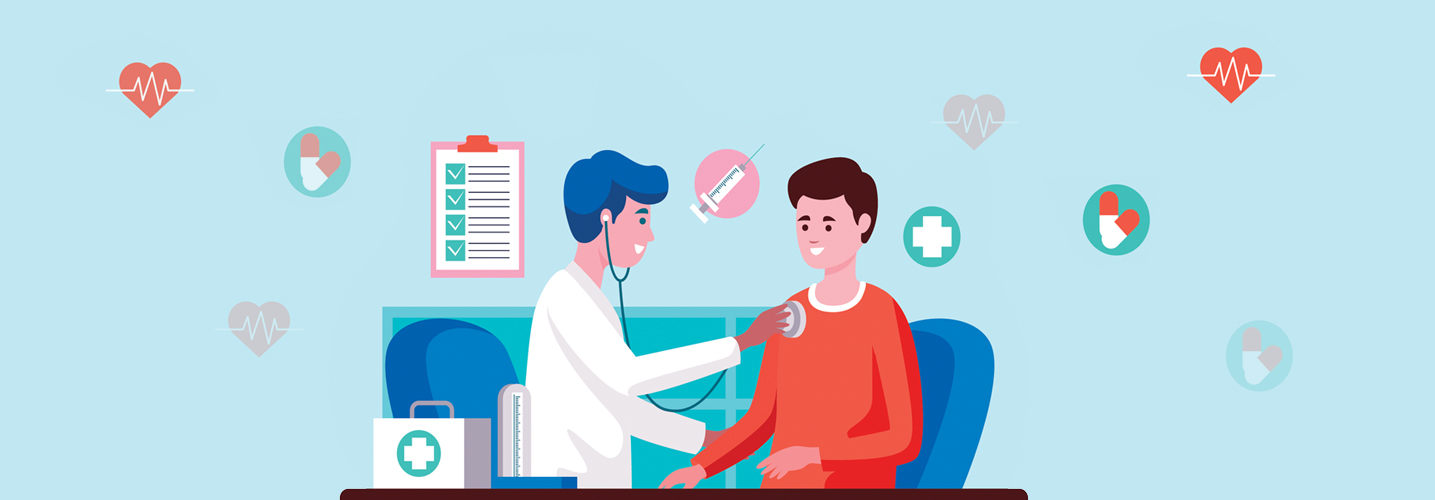
Diabetic Package Lab Investigations
- Fasting Blood Sugar
- Post Lunch Blood Sugar
- HBA1C
- Creatinine
- Urine For Micro Albuminuria
- ECG
- Lipid Profile
Try to get eight hours of sleep the night before your test
Drink water two hours before your test, it helps to produce urine sample
Keep a list of any medications (prescription and OTC) you’re taking for the examiner to record.
It’s better to avoid salty, fatty foods for at least 24 hours before your test, and two or three days would be even better.
Avoid exercise before a medical test can increase your heart rate and drop your potassium levels.
Don’t drink coffee or any caffeinated products for at least one hour before your test.
To keep blood sugar and blood pressure from increasing don’t eat for at least two hours before the test. Twelve hours of fasting is preferred, so try to schedule your exam in the morning so you can fast overnight.

Master Health Check Up Lab Investigations
- Complete Blood Picture (CBP)
- FBS / PLBS
- HBA1C
- Blood Urea / Creatinine
- Serum Lipid Profile
- Serum Calcium
- Uric Acid
- Liver Function Test
- T3, T4, TSH
- PSA (>50Years)
- Blood Grouping & RH Typing
- ECG
- USG Abdomen
- Chest X-Ray PA View
- Consultation: Physician
- Pap Smear - Female
- Gynaecologist Consultation - Female
Try to get eight hours of sleep the night before your test
Drink water two hours before your test, it helps to produce urine sample
Keep a list of any medications (prescription and OTC) you’re taking for the examiner to record.
It’s better to avoid salty, fatty foods for at least 24 hours before your test, and two or three days would be even better.
Avoid exercise before a medical test can increase your heart rate and drop your potassium levels.
Don’t drink coffee or any caffeinated products for at least one hour before your test.
To keep blood sugar and blood pressure from increasing don’t eat for at least two hours before the test. Twelve hours of fasting is preferred, so try to schedule your exam in the morning so you can fast overnight.

Executive Health Check-Up Lab Investigations
- Complete Blood Picture (CBP)
- FBS / PLBS
- HBA1C
- Blood Urea / Creatinine
- Serum Lipid Profile
- Serum Calcium
- Uric Acid
- Liver Function Test
- T3, T4, TSH
- PSA (>Sour)
- Blood Grouping & RH Typing
- ECG
- USG Abdomen
- 2D Echo
- PFT
- Chest X-Ray PA View
- Consultation: Physician, Cardiologist & Dietitian
- Pap Smear - Female
- Gynaecologist Consultation - Female
Try to get eight hours of sleep the night before your test
Drink water two hours before your test, it helps to produce urine sample
Keep a list of any medications (prescription and OTC) you’re taking for the examiner to record.
It’s better to avoid salty, fatty foods for at least 24 hours before your test, and two or three days would be even better.
Avoid exercise before a medical test can increase your heart rate and drop your potassium levels.
Don’t drink coffee or any caffeinated products for at least one hour before your test.
To keep blood sugar and blood pressure from increasing don’t eat for at least two hours before the test. Twelve hours of fasting is preferred, so try to schedule your exam in the morning so you can fast overnight.

Cardiac Check-up Package Lab Investigations
- Complete Blood Picture (CBP)
- FBS / PLBS
- HBA1C
- Blood Urea / Creatinine
- Serum Lipid Profile
- Serum Calcium
- Uric Acid
- Liver Function Test
- T3, T4, TSH
- PSA (>Sour)
- Blood Grouping & RH Typing
- ECG
- USG Abdomen
- 2D Echo
- TMT
- PFT
- Chest X-Ray PA View
- Consultation: Physician, Cardiologist & Dietitian.
- Pap Smear - Female
- Gynaecologist Consultation} Female
Try to get eight hours of sleep the night before your test
Drink water two hours before your test, it helps to produce urine sample
Keep a list of any medications (prescription and OTC) you’re taking for the examiner to record.
It’s better to avoid salty, fatty foods for at least 24 hours before your test, and two or three days would be even better.
Avoid exercise before a medical test can increase your heart rate and drop your potassium levels.
Don’t drink coffee or any caffeinated products for at least one hour before your test.
To keep blood sugar and blood pressure from increasing don’t eat for at least two hours before the test. Twelve hours of fasting is preferred, so try to schedule your exam in the morning so you can fast overnight.

Well Women Check-Up Lab Investigations
- Random Blood Sugar
- Complete Urine Examination
- Complete Blood Picture
- TSH
- Pap Smear
- Chest X-Ray PA View
- USG Breast
- USG Abdomen
- Gynaecologist Consultation.
Try to get eight hours of sleep the night before your test
Drink water two hours before your test, it helps to produce urine sample
Keep a list of any medications (prescription and OTC) you’re taking for the examiner to record.
It’s better to avoid salty, fatty foods for at least 24 hours before your test, and two or three days would be even better.
Avoid exercise before a medical test can increase your heart rate and drop your potassium levels.
Don’t drink coffee or any caffeinated products for at least one hour before your test.
To keep blood sugar and blood pressure from increasing don’t eat for at least two hours before the test. Twelve hours of fasting is preferred, so try to schedule your exam in the morning so you can fast overnight.